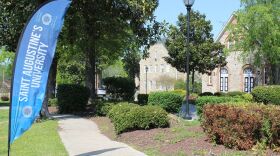A coalition of alumni, community members, and local clergy is protesting a multimillion-dollar loan agreement signed by Saint Augustine's University. The group claims the loan is "predatory" and a threat to the private HBCU's 157-year legacy.
The $7 million loan is between Saint Augustine's University and a Durham-based firm called Gothic Ventures. The agreement was secured with a deed of trust, which puts the HBCU's property at risk if the university can't pay back the loan and 24% interest rate, as well as a 2% loan management fee. The loan could eventually cost the university $30 million under the agreement.
A couple dozen people from the Save SAU coalition, Center for Responsible Lending, and other organizations gathered Wednesday to speak out against the agreement.
Several speakers said they are concerned the loan agreement is a "land grab" and effort to gentrify the community.
"To buy it and change it to reflect their vision, opposed to the vision of those who live in the community," said Clarence Laney, a 1986 SAU alum. "If for any reasons, Saint Augustine's is unable to repay Gothic Ventures, the land will be lost and the university as we know it will cease to be."

In August, Saint Augustine's University touted the loan as a key driver for successfully starting its fall semester.
The HBCU's previous spring semester was cut short when the university sent students home early amid severe financial problems. The university was having trouble meeting faculty payroll, couldn't pay student refunds, and faced nearly $10 million in federal tax liens.
The university's accrediting agency – the Southern Association of Colleges and Schools Commission on Colleges (SACSCOC) – had also voted to terminate Saint Augustine's accreditation and membership. This decision was later reversed by the agency's arbitration committee to give the HBCU one final chance to prove it can meet SACSCOC's financial standards.
According to the university, the $7 million loan with Gothic Ventures would help the HBCU "effectively manage its (financial) operations." In a press release, the university said the money would go toward settling outstanding balances like payroll and student refunds, as well as covering "essential operational expenses."
Kip Johnson, founder of Gothic Ventures, said he is "excited to partner with Saint Augustine's University during this pivotal time."
"Our belief in the transformative power of education aligns with the University's historic mission, and we are confident that this collaboration will lead to future successes for the institution and its community," Johnson said in the press release.
Interim President Marcus Burgess said the loan represents the university's "commitment" to students and staff.
"We are grateful for the belief that Gothic Ventures has placed in our vision, allowing us to focus on enhancing the academic experience while showcasing our resilience in the face of adversity," Burgess said in the press release.
Jaylon Herbin is the director of federal campaigns for the Center for Responsible Lending. He said the loan puts a "crushing burden on the university's future" and represents a predatory business practice.
"The school cannot pay it back, it's unmanageable," Herbin said. "How can a school pay operational costs? How can they pay staff? And then on top of that, still pay a loan back at the same time? They're not bringing in enough money in order to do that."

According to Herbin, a more "equitable" interest rate would be 9% to 10%.
"Saint Augustine's University (knew) that these terms were not acceptable," Herbin said at a press conference. "The loan as in question carries an unacceptable high interest rate at times when Saint Augustine's University is already financially stressed – struggling with rising operating costs, declining enrollment, and reduced government funding. This loan exacerbates its physical strain."
Saint Augustine's University has been on probation with its accrediting agency, SACSCOC, for nearly two years for failing to prove the university is financially sound.
The university has until next month to prove it can meet SACSCOC's financial standards to remain accredited. Universities must be accredited to receive federal funds like student financial aid.
As a private institution, one of Saint Augustine's University's main forms of income is student tuition. And unlike public universities, the private HBCU does not receive thousands of dollars from the state to supplement funding gaps.
In ten years, the HBCU went from having upwards of 1,300 students in 2012 to around 870 students in 2022. But after its accreditation challenges, this figure plunged – with the university enrolling only about 200 students in 2023.
Herbin, the federal campaigns director from the Center for Responsible Lending, said his organization and others are working to make sure Saint Augustine's "doors of opportunity" don't close.
"Saint Augustine's University is more than just a campus," Herbin said. "It is a place of hope, a place of learning, and it is a place for opportunity. But the future is at risk if we do not act quickly."
At the Wednesday press conference, the coalition made several demands to Gothic Ventures. This includes modifying the loan to reduce the interest rate to 9%, waiving a prepayment penalty fee, and returning all interest accrued under the 26% rate.
WUNC partners with Open Campus on higher education coverage.









